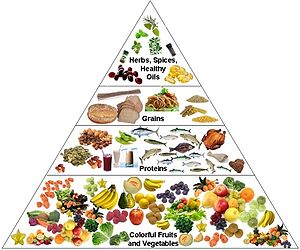 |
| English: Healthy nutrition pyramid with 7 to 9 servings of fruits and vegetables to get precious phytonutrients to feed your body at the cellular level. (Photo credit: Wikipedia) |
To work properly, the body should have the right mixture of nutrition.
Carbohydrates. They are the principal cause of ammunition in what you eat. Your body utilizes carbohydrates to create glucose, which may be used instantly or stored within you for later. An excessive amount of glucose, nevertheless, is stockpiled as fat. You can find two forms of carbohydrates - easy and complicated. Sugars are simple carbohydrates.
Proteins. Proteins help the body build and keep maintaining muscles along with other tissues. In addition, they operate in the construction of hormones. Extra protein is saved as fat.
Animal and vegetable are the two major types of proteins. Too much animal protein can cause high cholesterol, as it is high in saturated fat.
Fat. Strange as it may seem; fat is another nutrient your body requires. It comes in both saturated and unsaturated forms. Saturated fat puts you at risk of health problems. Unsaturated fat is healthy, but if it goes through any type of refinement process, it can become saturated fat.
Vitamins. These are also required nutrients. Different vitamins perform different tasks within the body. They can work on the metabolism to help with energy levels for any task you can think of that you need your body to perform. It has also been noted that certain vitamins can prevent disease.
For example, vitamins A, C, and E, also called antioxidants, can assist in the prevention of coronary artery disease by keeping build up from occurring on artery walls. Vitamin B-1 is needed for digestion and proper nervous system function. Vitamin B-2 is needed for normal cell growth. Vitamin B-3 helps to detoxify your body. Folic acid assists with production of red blood cells. Vitamin D assists in the absorption of calcium. Vitamin K helps your blood clot.
Minerals and trace elements. This is another nutrient your body requires. Both are used in many different body processes. Minerals like chlorine help make your digestive juices. Phosphorus helps build strong bones. Both can be found in the foods we consume, but with a trace element, your body just needs a tiny amount. Salt is one final nutrient your body requires. You should not consume more than 2400 milligrams per day, though, as it might raise your blood pressure.
You should follow several guidelines to create a well balanced, nutritional diet. First, try to consume two and one-half cups of vegetables and two cups of fruit each day. When making your selections for each day, be sure to choose a good variety. A good rough guide is to eat as many different colors as possible. This will help you to select from all five vegetable subgroups at least four times per week.
You must eat a minimum of about three ounces of whole-grain products every day. Certainly, half of your grain consumption ought to be whole grain based mostly. Milk also needs to be part of a healthy diet plan. Eat a minimum of forty-eight ounces of low-fat milk alternatively milk products each day. Your overall fat intake should be in between 10 and 30 % of the calorie consumption. The majority of the fat a person eats should be in the form of unsaturated fat, because unhealthy fats are able to do very much in order to harm your overall health. Meats, chicken, dry beans, and milk as well as milk products must be lean, low-fat, or simply fat-free. Lower than 10 % of your calorie consumption should originate from saturated fats, and you ought to stay away from trans-fatty acid.
Fiber-rich fruits, veggies and whole grains should be a normal part of your daily diet as well as potassium rich foods. Alcohol drinks should just be taken less often.
Excellent nutrition may be the basis of a healthy diet plan. Visit Diet Solution Tip - Nutrition blog for more tips and guide.






No comments:
Post a Comment